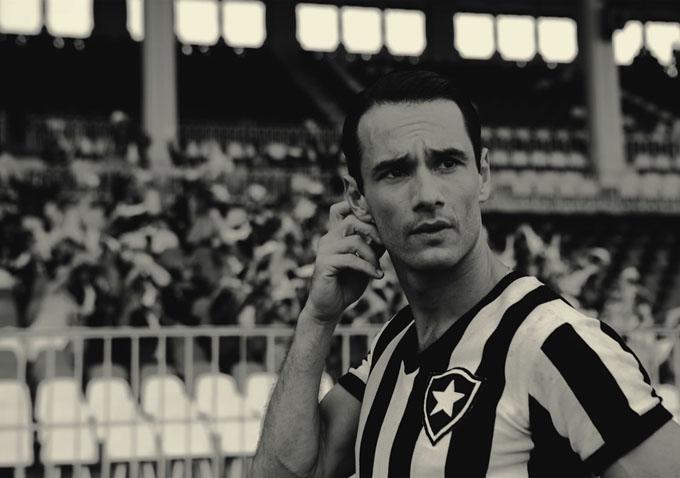Heleno de Freitas, the Greatest Brazilian to Not Play FIFA World Cup

Image Coutesy: The Playlist
Brazil have competed at the World Cup since the beginning of time—hieroglyphs found in ancient Mayan tombs are a testament to this fact. Well, almost. They have won the tournament a record five times, and qualified for every single World Cup. Hell will freeze over before Brazil miss out on the World Cup.
And all those appearances, guarantee one thing: If you’re Brazilian, half decent at the sport, have turned out in the yellow and blue a few times and scored a decent goal or two, chances are, you will, at some point of time, go to the World Cup. Hell, even Fred turned out for Brazil at the World Cup. No, not that one. This one.
You get the point.
And so, it doesn’t make sense, when you learn that one of the few Brazilian footballers to have a Hollywood movie made about him, never played the World Cup. The movie, in fairness, does make that point early in.
READ MORE | Odd Misses at FIFA World Cup: Alfredo Di Stéfano, the Slips Between the Cup and His Lip
Worse still, in Brazil’s greatest moment of triumph—at the Rasunda Stadium in 1958, when they lifted their first World Cup—as doctors, patients and staff at an asylum in Barbacena, celebrated, Heleno de Freitas, locked alone in a room, filled his mouth with cigarettes, lit them and tried to smoke himself to death.
A decade prior, de Freitas, whose playing days spanned from 1939 to 1951, had been Brazil’s greatest forward. He had dreamed of playing in a World Cup, of winning it for Brazil. What Pelé did at 17, he had yearned for all his life. For him, hearing of Pelé’s success was too much. He was prevented from committing suicide but, from then on, his dementia worsened. He ate the newspaper clippings detailing his triumphs, peeling them from the wall where a nurse had lovingly pasted them, and drifted deeper into decline. He died the following year, aged just 39.
Spotted at the beach
In his book, Football in Sun and Shadow, Uruguayan poet Eduardo Galeano says, “[Heleno de Freitas] had Rudolph Valentino's face and the temper of a mad dog. On the playing field he sparkled. One night, in a casino, he lost all his money. Another night, who knows where, he lost all his desire to live.”
READ MORE | Argentina’s Pull-out from FIFA World Cup Warm-up Dents Israel’s Arrogance
As Brazilian tradition demands, Heleno was spotted juggling oranges on the beach and signed by Botafogo [a Brazilian club based in Botafogo, Rio de Janeiro] at the age of 17.
Two years later, he was in the first team, scoring goals, berating teammates and opponents, creating his legend. Born into a wealthy family, Heleno had qualified as a lawyer, but, by the 1940s, he was clearly never going to be one. He was the clear star at Botafogo. Fans sang carnival songs about him, and he responded by dancing the samba on the pitch. In between, he would score goals—lots of them.
Galeano describes—with a fair bit of hyperbole no doubt—a strike against Flamengo in 1947: “Heleno had his back to the net. The ball flew down from above. He trapped it with his chest and whipped around without letting it fall. His body arched, the ball still resting on his chest, he surveyed the scene. Between him and the goal stood a multitude. There were more people in Flamengo's area than in all Brazil. If the ball hit the ground he was lost. So Heleno started walking and calmly crossed the enemy lines with his body curved back and the ball on his chest. No one could knock it off him without committing a foul, and he was in the goal area. When Heleno reached the goalmouth, he straightened up. The ball slid to his feet and he scored.”
READ MORE | From Telstar 18 to Boots and Jerseys, the Plastic Side of FIFA World Cup
By then, though, the decline had begun. Heleno wasn’t just a great footballer, he was also a great drinker, a gambler and womaniser. He was, undoubtedly, the first bad boy of Brazilian football. He was addicted to ether, soaking a handkerchief in the liquid and sniffing it for a damaging high. At some point he contracted syphilis, but refused the treatment fearing the effect it would have on his career.
The runner-up curse
All of these would’ve been enough to end a talented career, but Heleno had more faults. When he wasn’t scoring goals, or creating them, he was berating his teammates for not being good enough. Botafogo finished second in the Brazilian championship in 1944, ’45 and ’46. In ’46 with Heleno up front, Brazil finished second in the South American Championship.
All those second-place finishes did the job the ether couldn’t. Heleno came unhinged. After finishing second for the fourth consecutive season in 1948, he reacted badly and took his anger out on the locker room. Carlito Rocha, the president of Botafogo, decided the star was the problem and sold Heleno to Boca Juniors. For the club, it was undoubtedly the right decision: they won the league in 1948. For Heleno, it was a disaster.
Without his wife to act as some form of check, he spun further out in Argentina. He hated the cold, enjoyed his social life, but never really settled. Within a year he was back, at Vasco in Brazil. Vasco won the title that season, but, for Heleno, it was an empty triumph. Pulled up for his lazy attitude in training, Heleno, returned to the stadium with a gun, placed it against the head of the coach, Flavio Costa, and pulled the trigger. Thankfully it was not loaded.
READ MORE | 10 Tales of Intrigue From the First FIFA World Cup
After leaving Vasco, he joined the rebel league in Colombia, playing for the Barranquilla side Atlético Junior. By this time, Brazil were going to the World Cup, but Heleno wasn’t. Even a drastic return to form wouldn’t have earned him a place. Brazil had appointed Flavio Costa as coach.
Brazil failed to win the World Cup, and Heleno still dreamt of one. He returned to Brazil in 1951, signing for the Rio-based club América. He made his debut for them at the Maracanã and was sent off 25 minutes in for abusing his own teammates. It was his final match. Within two years, he was confined to an asylum.
It was a tragedy of Shakespearean cost. At the peak of his career, Heleno was failed by the World War, which put paid to any chance he had at World Cup glory. When it finally did come, his battles were very different, and in some ways, unwinnable.
Get the latest reports & analysis with people's perspective on Protests, movements & deep analytical videos, discussions of the current affairs in your Telegram app. Subscribe to NewsClick's Telegram channel & get Real-Time updates on stories, as they get published on our website.
























